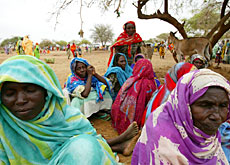Swiss find security in Darfur unsatisfactory

A Swiss delegation returning from Sudan says that despite improvements in access to displaced people in war-ravaged Darfur, security is unsatisfactory.
After a visit to refugee camps close to the Chad border and meeting with government ministers, the delegation feels there is still much to be done.
“There is still a humanitarian situation the world cannot accept,” commented Hansjürg Ambühl, head of the Africa division at the Swiss Humanitarian Aid Unit.
“There is a responsibility of the parliament of Sudan, of the rebels and of the international community to come to a political solution – and the sooner the better,” Ambühl told swissinfo.
The aim of the four-day visit was to assess the situation in the field and to continue dialogue with the government.
Aid alone not enough
In June, Swiss Foreign Minister Micheline Calmy-Rey visited Sudan and said that aid alone would not be enough to end the conflict between rebels and government-backed militias.
The latest Swiss delegation toured a number of camps of displaced people around the rural town of Al Geneina, about 30 kilometres from the Chad border, with some sheltering 40,000 people.
The mission also looked at the operations of Swiss non-governmental organisations, which have been active there for about six months.
“The situation of assistance has improved a lot since we were there last time, but there are still a great number of people remaining in the camps and they have no perspective of going back to their original village,” said Ambühl.
He said that the security situation for the camps was of “particular concern” because nothing had changed on the ground.
“No confidence”
“The government has deployed police and security forces to the villages but the displaced people have no confidence in them and they are not daring to leave the camps,” he said.
“They would not move out because every time there would be attacks by the Janjaweed [Arab militias], so the situation remains basically the same in the camps,” added Ambühl.
The Swiss delegation also included Ambassador Josef Bucher, a specialist in conflict resolution, who said that hopes for peace depended on an agreement being hammered out between the Khartoum government and rebels in the south of the country.
Such an agreement could also act as a signal for the parties in the Darfur conflict to come to a peace settlement, he said.
Meditation efforts sponsored by the African Union are due to take place in the Nigerian capital, Abuja, on August 23.
Switzerland has 12 experts in Darfur and Chad who are working within United Nations organisations or for the International Committee of the Red Cross.
Swiss aid
For the current year, Switzerland has pledged around SFr10 million in humanitarian assistance to the region.
“This is channelled through international organisations and through the Swiss NGOs we have just visited,” explained Ambühl.
“We have provided, and we continue to provide, specialised experts from the Swiss Humanitarian Aid Unit… specialists in water and sanitation, in health and in logistics, both on the Chad side and on the Darfur side,” he added.
The Darfur conflict began 18 months ago, when black African factions rose up against Sudan’s Arab-dominated government, claiming discrimination in the distribution of the large, arid region’s scarce resources.
Since then, Arab militias called the Janjaweed and purportedly backed by Khartoum have gone on a rampage in the region.
According to the United Nations, up to 50,000 people have been killed and more than a million forced to flee their homes in what the organisation has described as the world’s worst humanitarian crisis.
Aid organisations have said, though, that the number of dead could be well over 100,000.
swissinfo, Robert Brookes
A Swiss mission back from Sudan says that the humanitarian situation in Darfur is still unacceptable.
It found that situation was unsatisfactory, although access to displaced people had improved.
It heard that people in the camps were afraid to leave the camps because of attacks from Arab militias.
Switzerland has pledged SFr10 million in humanitarian aid to the region this year.

In compliance with the JTI standards
More: SWI swissinfo.ch certified by the Journalism Trust Initiative











You can find an overview of ongoing debates with our journalists here . Please join us!
If you want to start a conversation about a topic raised in this article or want to report factual errors, email us at english@swissinfo.ch.